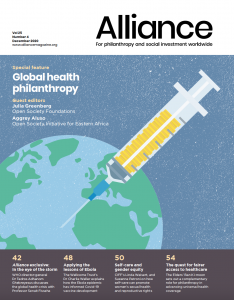Health philanthropy leaders at the Open Society Foundations have called for a change of direction in global health funding which they say too often favours ‘private interests over public provision’.
 The Open Society Foundations’ Julia Greenberg and Aggrey Aluso make their case for change as guest editors of a new issue of Alliance magazine dedicated to global health philanthropy. Writing in Alliance, Greenberg, who directs OSF’s public health governance and financing program and Aluso, who manages OSF’s Health and Rights Program in Kenya, urge the philanthropic sector to ‘reflect on the complicated political and economic role we play in global health’.
The Open Society Foundations’ Julia Greenberg and Aggrey Aluso make their case for change as guest editors of a new issue of Alliance magazine dedicated to global health philanthropy. Writing in Alliance, Greenberg, who directs OSF’s public health governance and financing program and Aluso, who manages OSF’s Health and Rights Program in Kenya, urge the philanthropic sector to ‘reflect on the complicated political and economic role we play in global health’.
In their article, Greenberg and Aluso raise concerns that foreign funding from both philanthropic and governmental sources risk stifling local and national control when it comes to handling their own health systems and programmes.
Greenberg and Aluso note that foreign governmental donors and philanthropy provide 40 per cent of all health spending in nine African countries, and yet most lower income countries are currently spending less than half of what they should be on healthcare examined against the benchmarks of the SDGs. SDG 3 mandates that 8.3 per cent of GDP should be spent on health care by 2030.
‘These data show the pre-eminence of private foundations and donor governments – each with their own geopolitical interest or niche funding area – in the health policy-making of lower income nations,’ write Greenberg and Aluso. ‘This is compounded by a focus of most donors on disease-specific outcomes rather than on broader health systems. The result? The fragmentation of health systems in low- and middle-income countries, and the illusion that donors have health covered, letting governments off the hook for the provision of basic health services.
An absence of accountability
A huge influx of private money also risks creating ‘an accountability black box’, warn Greenberg and Aluso. ‘The inability to see how healthcare systems are being financed is particularly damaging because it undermines the efforts of citizens to advocate for alternative healthcare models.’
These concerns are echoed by academics Susan Erikson and Leigh Johnson who have studied so-called ‘pandemic bonds’ a financial tool pioneered by the World Bank. In an article in medical journal The Lancet, republished in Alliance, Erikson and Johnson raise concerns about the impact of pandemic bonds which release funding only after certain, independently determined, thresholds are met. These ‘aid triggers are black boxed outside of public oversight’ according to Erikson and Johnson.
Greenberg and Aluso also express fears that the influx of large flows of funding can breed corruption ‘as health is increasingly seen as a cash cow for government coffers, a profit centre for national and multinational hospital chains and a market opportunity for insurance and pharmaceutical companies.’
The authors question the focus of certain donors’ support on market-driven models and raise concerns about how pharmaceutical companies profit from close relationships and partnerships with large foundations such as the Bill & Melinda Gates Foundation.
‘These pharma companies are poised to profit once again in the race for a Covid vaccine, following the influx of public money from the US and European countries for advance purchases of vaccines for their own countries. While Bill Gates himself acknowledges that so-called ‘vaccine nationalism’ is a problem, his solution, in this case, is to forge a partnership with pharmaceutical companies to lower the prices and dictate the terms of access for lower income countries. Not only are these arrangements typically made without public oversight, but they do not change the intellectual property rules, and monopoly pricing, which prevent more systemic change over the longer term,’ write Greenberg and Aluso.
A new role for philanthropy
In their article, Greenberg and Aluso call for a ‘reimagining of philanthropic investments in global health’.
‘Consider with us instead an affirmative role for global health philanthropy in a world that will undoubtedly be shaped by this pandemic for decades to come,’ write Greenberg and Aluso. ‘The fact that health systems from the US to Ecuador buckled under the onslaught of the pandemic, suggests an important role for philanthropy in supporting a transformative vision of universal healthcare. This vision resists the radical privatisation which compromised the US response to the pandemic, the politicisation against which WHO director-general Dr Tedros Adhanom Ghebreyesus so powerfully and painfully cautions in this special feature and the exclusion of groups whose rights are denied by authoritarian states and fundamentalist movements proliferating around the globe.’
Among the areas in which philanthropy can play an ‘affirmative role’ is supporting a citizen-centred approach to health; securing access to health for populations whose rights are denied due to criminalisation, fundamentalism, and intense social stigma; and identifying clear gaps in the funding, such as mental health and sexual and reproductive health.
‘…We cannot play our proper role in helping to end health disparities without addressing economic inequality and racism’. It follows that we cannot fund health organisations alone, nor can we fund people to work on health in isolation from its underlying social determinants. We need to address the issues that affect… sectors together.’
Join a panel of experts, including guest editors Greenberg and Aluso, on a webinar debating these issues on 10 December 2020. To read the full issue on Global Health Philanthropy, click here.







Comments (0)